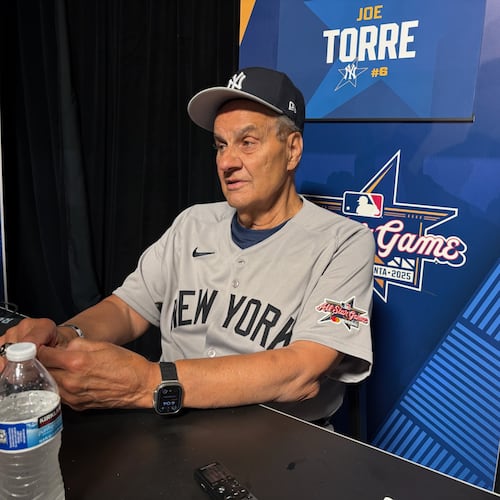Brian Snitker has calmed the waters, which was kind of the idea. Having been 9-28 under Fredi Gonzalez, the Braves are 3-3 under Snitker. If not quite good, it’s definitely better.
More to the point, the simmering-since-Week-2 issue of managerial status has been tabled until October. Snitker will see out the final season at Turner Field. It would be nigh-impossible for the Braves to play any worse under the new man than they had over the first 37 games. But how much better might they be?
Baseball Prospectus has them finishing 62-100; FanGraphs projects 60-102. Those would be bad seasons, yes, but not historically bad. The 1988 Braves were 54-106. (Two games were rained out and, by popular demand, left unplayed.) Those wouldn't be as bad as the Astros, who lost 106 games in 2011, 107 in 2012 and 111 in 2013, and would be in the neighborhood of the 2012 Cubs, who lost 101.
For these Braves not to lose 100 games, they’d have to go 51-68. That’s a winning percentage of .432. At 12-31, they’ve played .279 ball. That’s more or less the difference between winning once every four games to twice every five. That’s not a lot to ask, but this isn’t much of a team. The hitting will always be lacking. The starting pitching has showed signs of stabilizing, though Aaron Blair’s return to Gwinnett was a setback. (Casey Kelly, who started Sunday to no great effect, was acquired in the Christian Bethancourt trade, which was made to cut losses.)
That said, the Braves of June and especially August should be rather different that those we see today, and it’s difficult to handicap the unknown. Still, we wouldn’t be doing our journalistic duty if we didn’t try. Here’s what’s apt to happen the rest of the season:
Nick Markakis will be traded. He'll have value to a contending team at the trade deadline as a left-handed bat. His value to the Braves is negligible. He's 32. He's owed $22 million over the next two seasons. He has four home runs in 1 ¼ seasons, which is bad for a middle infielder but terrible for a corner outfielder. His WAR (wins above replacement) value for this season is 0.1; Melvin Upton Jr.'s WAR is 1.7.
Erick Aybar will be traded – or cut. The Braves never viewed him as more than a placeholder between Andrelton Simmons and Ozzie Albies; neither did they imagine he'd become the worst player in baseball. (Aybar's WAR value is minus-1.6, ranking him last in the majors.) If they can get anything for him, they will. If they can't, they'll let him go. Albies is nearly ready, and Dansby Swanson — acquired 3 1/2 weeks after the Simmons trade — isn't far behind. One will be the shortstop of the future.
Albies and Rio Ruiz will be summoned around the All-Star break; Swanson will be a September callup. With the season gone, there's no sense messing around with marginal 30-somethings. Albies and the third baseman Ruiz are already in Class AAA; Swanson has kept hitting after his promotion to Class AA. They should whet some appetites for SunTrust Park.
Ender Inciarte will not be traded. Could be wrong about this, but he's 25 and he'd seem to fit the Braves' future plans. He's a great fielder. He figures to hit more than he has.
Julio Teheran will not be traded. If there's one knock on the Braves' passel of young pitching, it's that there's no sure-fire No. 1 starter in the bunch. The way he's going, Teheran – who's 25 – still comes closer to fitting that job description than anyone else in the chain. It might take another Swanson/Inciarte/Blair package for the Braves to move Teheran now.
The Braves will lose 101 games. This splits the difference between the above numerical projections and assumes much personnel upheaval. And, given the way this season started, 61-101 wouldn't seem all that awful. Well, would it?
About the Author
Keep Reading
The Latest
Featured



